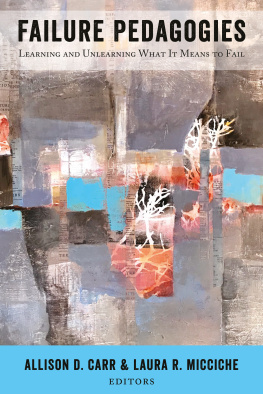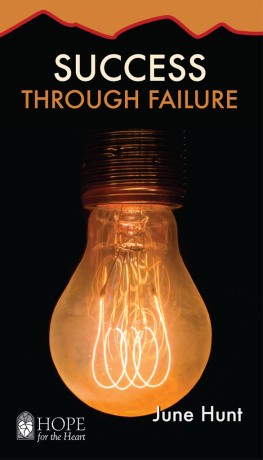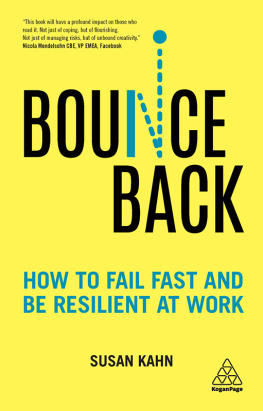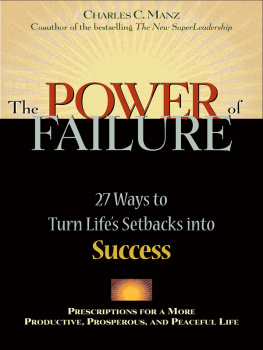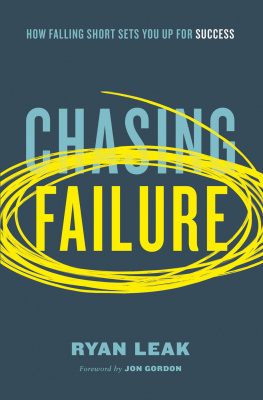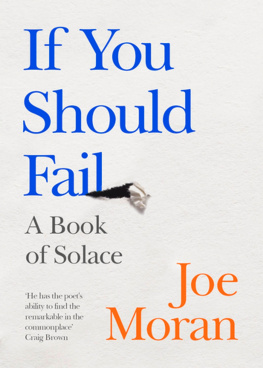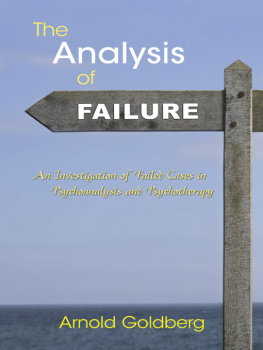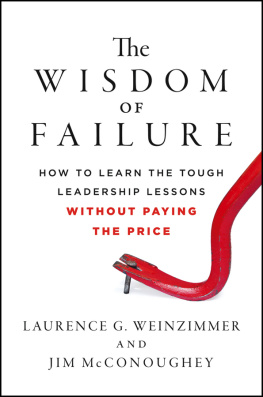
This book is part of the Peter Lang Education list.
Every volume is peer reviewed and meets
the highest quality standards for content and production.

Failure Pedagogies
Learning and Unlearning
What It Means to Fail
Edited by
Allison D. Carr and Laura R. Micciche

Library of Congress Cataloging-in-Publication Data
Names: Carr, Allison D., editor. | Micciche, Laura R., editor.
Title: Failure pedagogies: learning and unlearning what it means to fail /
edited by Allison D. Carr and Laura R. Micciche.
Description: New York: Peter Lang, 2020.
Includes bibliographical references and index.
Identifiers: LCCN 2020009289 (print) | LCCN 2020009290 (ebook)
ISBN 978-1-4331-7486-5 (hardback)
ISBN 978-1-4331-7487-2 (paperback) | ISBN 978-1-4331-7488-9 (ebook pdf)
ISBN 978-1-4331-7489-6 (epub) | ISBN 978-1-4331-7490-2 (mobi)
Subjects: LCSH: School failure. | Culturally relevant pedagogy
Classification: LCC LB1088 .F35 2020 (print) | LCC LB1088 (ebook) |
DDC 371.2/85dc23
LC record available at https://lccn.loc.gov/2020009289
LC ebook record available at https://lccn.loc.gov/2020009290
DOI 10.3726/b16255
Bibliographic information published by Die Deutsche Nationalbibliothek .
Die Deutsche Nationalbibliothek lists this publication in the Deutsche
Nationalbibliografie; detailed bibliographic data are available
on the Internet at http://dnb.d-nb.de/.
2020 Peter Lang Publishing, Inc., New York
29 Broadway, 18th floor, New York, NY 10006
www.peterlang.com
All rights reserved.
Reprint or reproduction, even partially, in all forms such as microfilm,
xerography, microfiche, microcard, and offset strictly prohibited.
About the author
Allison D. Carr , Assistant Professor of Rhetoric at Coe College (IA), earned her Ph.D. from the University of Cincinnati in 2014. Her work has appeared in Composition Forum, Pedagogy, Computers & Composition Online, and multiple edited volumes.
Laura R. Micciche , Professor of English at the University of Cincinnati, earned her Ph.D. from the University of Wisconsin-Milwaukee in 1999. She has published three books on writing and emotion and recently completed a six-year term editing Composition Studies.
About the book
Can we all learn from failure equally? Failure Pedagogies examines the ways failure is often appropriated to advantage those most likely to be insulated from the risks associated with pursuing it as a creative strategy. Contributors ask questions that examine what happens when failures do not necessarily lead to progress or innovation: How is risk distributed? For whom is failure safe and why? For whom is failure a real end rather than an opening to generative possibilities? To address these questions, we focus largely on pedagogical settingsclassrooms, universities, and the conventions that reign therebut also confi gure pedagogy as a broad cultural practice that teaches acceptable and unacceptable forms of resistance, subversion, and risk. Contributors focus on a range of topics, including teaching and failure, language failures, fake news, disaster response failures, academic racism, sexual harassment and gender bias, queer failure, intersectionality and infertility activism, and institutional failures to imagine disabled bodies. Failure Pedagogies will be of interest to scholars, students, and teachers of writing, rhetoric, and popular culture.
This eBook can be cited
This edition of the eBook can be cited. To enable this we have marked the start and end of a page. In cases where a word straddles a page break, the marker is placed inside the word at exactly the same position as in the physical book. This means that occasionally a word might be bifurcated by this marker.
Table of Contents
Chris Hay
Allison D. Carr and Laura R. Micciche
Caddie Alford
Alba Newmann Holmes and Kara Wittman
Kate Pantelides
Darci L. Thoune
Jim Ridolfo
R. J. Lambert
Nancy G. Barrn and Sibylle Gruber
Anne Dalke
Shari J. Stenberg and Stacey Waite
Gavin P. Johnson and Ryan Sheehan
Jeanette Lehn
Cassandra Phillips and Joanne Baird Giordano
Michelle LaFrance
Julie Myatt
Maria Novotny with Juliette Givhan
Kara Taczak and Debbie Gale Mitchell
Adam Hubrig
Aja Y. Martinez
Asao B. Inoue
viii | ix
CHAPTER 7
INTERCHAPTER 2
ix | x
CHAPTER 12
CHAPTER 14
CHAPTER 15
x | xi
CHRIS HAY
For a horrible moment, we thought wed failed. The Chief Statistician for the Australian Bureau of Statistics, David Kalisch, had taken four minutes and six seconds to get to this point, before declaring:
And now the official results of the Australian Marriage Law Postal Survey. For the national result, Yes responses: seven million, eight hundred and seventeen thousand, and two hundred and forty seven votes
A pause, filled by the inaudible sound of queer activists stomachs simultaneously dropping around the country. It didnt sound like enoughthe Postal Survey had been voluntary, and while the total response figure had been reported earlier in Kalischs speech, this was no time to rely on mental mathematics. He continued, representing sixty-one point six per cent of clear responses. That is, 61.6% of clear responses were yes. He kept talking, but none of us heard: a colleague was banging against the wall that separated our offices in triumph; the students gathered below our windows were roaring. Marriage equality was finally on its way to becoming the law of the land.
The bland, procedural name of the instrument belied the seriousness of the stakes: For better or worse, the Marriage Law Postal Survey represented the culmination of years of activism towards marriage equality, and a loss in the popular vote would have taken the cause off Australias legislative agenda for the foreseeable xi |, 262).
For many queer folk and our allies, merely participating in the Postal Survey was a loaded choice, given the effrontery of the government outsourcing its legislative responsibilities to the electorate, and in so doing inviting the populace to participate in months of debate about our humanity (Shaw ). We queers are practised failures, and no strangers to staying outside the system to question its legitimacy. In contesting Kirbys resignation to failure, others asked questions similar to those posed by Jeanette Lehn in this volume: Who pays for failures, and, if any insight is gained, who is set up to gain from that transaction? The boycott movement forced us to confront a question that drives Shari Stenberg and Stacey Waites chapter: What options for resistance exist? In the end, there were very few such options: With teeth gritted to ward off failure, we joined the yes campaign (and, for what it is worth, eventually Kirby did too).
For every success during the campaign period, there had been a failure. For every heart-warming social media video of a campaigner coming out to a family member who then reassures them of their yes, a young person self-harmed in the wake of the publicly funded campaigns that clogged the airwaves (see Verrelli et al. , 268).

